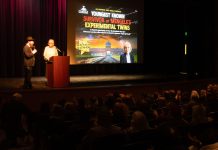A survey paid for by the company that wants to build a 500-room lodge and waterpark near Gilroy Gardens said that 63 percent of Gilroyans favored the Great Wolf Lodge project.
You’d never know that based on the people who came to object at Tuesday’s city council study session on the proposed project.
Alex Evans, of Oakland’s EMC Research, polled 450 residents by telephone, 33 percent of whom strongly support the construction while 30 percent, somewhat supported it. On the other side 19 percent strongly oppose it and 13 percent somewhat oppose the park.
EMC concluded that 38 percent of Gilroyans believe that increasing tourism to Gilroy was a high priority and that 69 percent support encouraging tourism in Gilroy.
“Our research tells us that families are traveling somewhere, so why not Gilroy,” said Bryson Heezen, a Great Wolf director.
The privately-owned Madison, Wisconsin-based Great Wolf Lodge, with 14 waterpark hotels across the country, has been negotiating with the city to build a hotel, 1,000 capacity convention center and indoor waterpark on 35 acres of hillside land adjacent to Gilroy Gardens.
The company finished its biggest park in Garden Grove last year, just down the street from Disneyland. That city laid out close to $100 million for the company and is seeing more than $10 million a year in tax revenues from it.
Gilroy and Great Wolf are in the midst of a 60 day exclusivity period, which will expire on September 30. The exclusivity agreement was intended to examine a land lease, to gather community input and to discuss a public-partnership in regards to financing.
Heezen has said the company doesn’t want to build in a city where it isn’t wanted. Most of its properties are in smaller suburban cities adjacent to big ones and draw guests from hundreds of miles away. Rooms cost from $200 to $600 and can accommodate seven people, like a lodge.
Gilroy was approached by Great Wolf in the middle of 2016 about the potential of building its newest location.
Gilroy was one of several cities under consideration, including Brentwood and Manteca. The company had looked at land along Highway 101, but found the acreage leading up to Mount Madonna was more in keeping with the woodsy lodge them the chain prefers.
“We understand the issues with the site,” Heezen said. ”There seems to be a misconception that we want our site to be seen from Hecker Pass. That is not the case. We do not want to disrupt the atmosphere. We want to push the building as far away from Hecker Pass and the neighborhood as much as possible.”
City Engineer Stan Stubchaer said that the land would need to be completely cleared and to connect the site to sewage and water for a total cost of $21 million. He estimated it will take up to 18 months to clear the site and connect with PG&E and other utilities.
Many of the people who objected for more than two hours Tuesday were from the exclusive Eagle Ridge gated community. They wore black to protest the project and continued to applaud
their speakers despite constant reminders from Mayor Roland Velasco asking them to hold off feedback after speakers.
Many of them said they worried about how the project will affect their home values, the impacts on traffic and how the resort will affect the environment on the Hecker Pass Corridor.
“It looks great for kids, but the proposed Hecker Pass Corridor is not a good place for this,”said Lori Flores. “There is a pronounced echo there and the water slides will be heard, even if they are enclosed. I would like that green space at Hecker Pass preserved for my grandkids. If you make an exception for this now, other projects will follow.”
Peggy Vix echoed her.
“This massive water park hotel is not appropriate for the Gilroy Gardens location,” she said. “If Great Wolf found another site in town, we would be happy to welcome you to Gilroy. We are a small, rural town, and Hecker Pass is very special to us.”
Gilroy Economic Development Corporation President Tammy Brownlow and Chamber of Commerce President Mark Turner favored the project for the money it would bring to the city.
“From an economic development standpoint, projects like this don’t come around very often,” Brownlow said. “This is a company that wants to commit $200 million to our community and along with the jobs it brings, those benefits can be very beneficial. The city does not have a spending problem, but a revenue problem. This project could bring in a lot of revenue for roads, police and fire.”
The company made its pitch to the residents stressing it was environmentally sensitive.
Heezen said the largest Great Wolf Lodge uses less water than an Olympic-sized swimming pool, or slightly under 600,000 gallons. But the hotel guests could use a significant amount of water, he added.
The company, which was started in the Wisconsin Dells was founded by Turk Waterman, who decided to put a roof over an existing water park that was near a hotel. The proposed Gilroy location would be the fifteenth site for the company.
“The majority of our investment goes into the infrastructure,” Heezen said. “We have the most state-of-the-art equipment to use water in the most efficient ways possible.”
Heezen estimated that Gilroy would bring in $1 million in TBID revenue, $5 million in marketing spending, payroll costs, money spent with local vendors and attracted business to other Gilroy businesses and attractions. Heezen touted that Great Wolf would boost the value of the city-owned land where the resort would be built and the increase of business to Gilroy Gardens.
The city’s community development director Kristi Adams told the audience the lodge wouldn’t affect traffic as much as they might fear.
“This is not the average hotel,” she said. “People stay more than one night on average. This kind of development is not going to generate the kind of traffic that a normal hotel would bring.”
Abrams said Great Wolf would need to not only pass an environmental review but that they would need to conduct a study of traffic and noise impacts. If the resort could not control noise satisfactorily, they would need to go through a full environmental impact study which would ultimately need to go to city council for a vote.














